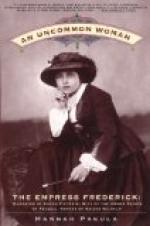“She is inconsiderate,” thought the regent; “she allows herself to be carried away by her temperament, and behind her inclination and her weakness for handsome grenadiers and soldiers, her enemies seek to discover an insidious and well-considered conspiracy; this is cruel and unjust! This good Elizabeth must be warned, that she may become more cautious, and give her numerous enemies no occasion for suspecting her. Poor innocent child, so gay and ingenuous, she plays with roses under which serpents lie concealed! It is my duty to warn her, and I will.”
Wholly penetrated with this noble and generous resolution, the regent drew her cousin Elizabeth into the little boudoir which lay at the end of the hall, offering a convenient resting-place for a confidential conversation.
But at this moment Anna’s eyes fell upon the lace mantelet of the princess, and quite involuntarily came to her mind the warning words of Ostermann, who had said to her: “The French ambassador, by command of his government, provides the princess not only with money, but also with the newest modes and most costly stuffs.” This lace mantelet could surely only come from Paris; nothing similar to it had been seen in St. Petersburg; it certainly required especial sources and especial means for the procurement of such a rare and magnificent exemplar.
A cloud drew over the regent’s brow, and in a rather sharp and cutting tone she said; “One question, princess! How came you by this admirable lace veil, the like of which I have not seen here in St. Petersburg?”
While putting this question, the regent’s eyes were fixed with a piercing, interrogating expression upon the face of the princess: she wished to observe the slightest shrinking, the least movement of her features.
But Elizabeth was prepared for the question; she had already considered her answer with the marquis and Lestocq. Her features therefore betrayed not the least disturbance or disquiet; raising her bright and childlike eyes, she said, with an unconstrained smile: “You wonder, do you not, how I came by this costly ornament? Ah, I have for the last eight days rejoiced in the expectation of surprising you to-day with the sight of it!”
“But you have not yet told me whence you have these costly laces?” asked the regent in a sharper tone.
“It is a wager I have won of the good Marquis de la Chetardie,” said Elizabeth, without embarrassment, “and your highness must confess that this French ambassador has paid his wager with much taste.”
The regent had constantly become more serious and gloomy. A dark, fatal suspicion for a moment overclouded her soul, and in her usually unsuspicious mind arose the questions: “What if Ostermann was right, if Elizabeth is really conspiring, and the French ambassador is her confederate?”
“And what, if one may ask, was the subject of the wager?” she asked, with the tone of an inquisitor.




